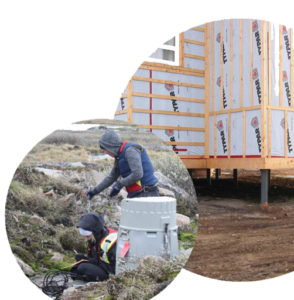Northern communities now have access to two new standardization resources that provide important strategies to integrate climate resiliency into building and infrastructure design, guides and codes. Specifically, CSA Group recently published:
- A new standard – Planning, Design, Operation, and Maintenance of Municipal Wastewater Treatment in Northern Communities using Lagoon and Wetland Systems (CSA W203:19) (link is external); and
- An updated guidance document – PLUS 4011: Technical Guide: Infrastructure in Permafrost: A guideline for climate change adaptation (link is external).

Canadians can access these standards for free until June 2024, while the usual fee is waived thanks to funding the Standards Council of Canada (SCC) received from the Government of Canada for the Standards to Support Climate Resilience in Infrastructure program. Through this program, SCC is investing in innovative standardization strategies targeted at infrastructure adaptation and resilience – including in Canada’s North with the Northern Infrastructure Standardization Initiative, one of the program’s three key areas. The region’s unique geography, climatic conditions, population distribution and cultural characteristics mean standards need to be tailored to the local environment if they are to be relevant and effective.
“Even though municipal wastewater treatment systems that use passive lagoon and/or wetland design are common throughout the North, current guidelines or standards specific to these systems did not exist in the Northwest Territories,” explains Heather Scott, senior technical advisor at the Mackenzie Valley Land and Water Board. “Now a standard that includes the most recent research on northern wastewater treatment performance and outlines best practices for planning, designing, operating and maintaining these systems is available. It was collaboratively developed by professionals who design, regulate, operate and support municipal wastewater treatment in northern communities,” she explains.
An updated technical guide on infrastructure in permafrost – PLUS 4011 – also provides much-needed guidelines as temperatures in Canada’s North increase. Warming there occurs at nearly three times the global rate (link is external), and exposed permafrost is thawing so quickly that several metres of soil can now destabilize in days.
“The new guideline not only includes up-to-date knowledge on trends and the current state of permafrost throughout Canada, it is also forward-looking with projections on how climate change may continue to affect these regions in the future” explained Christopher Burn, co-chair of the PLUS 4011 Technical Subcommittee. “It includes practical tools, including an assessment tool to evaluate the risk posed by climate warming for ground conditions at proposed construction sites and a step-by-step guide to incorporate climate-related analysis into planning and design processes” he further explained.
Resources such as these are vital to equip engineers, planners, developers, decision-makers, reviewers, inspectors and contractors with tools to mitigate climate-change-induced risk at the design, operation and maintenance stages, and to anticipate and accommodate climate change effects in northern Canada.
SCC owes a big part of its success in this area to partnerships with northern communities. By working with people living and working in the North we can ensure our actions meet their needs.
“On a visit to Iqaluit ten years ago, community leaders were already talking about failing infrastructure that was escalating the challenges faced by people living in these remote areas,” explains SCC CEO Chantal Guay. “As the impacts of a changing climate become more widespread, SCC remains invested in collaborating with northern communities and standards development organizations like CSA Group to ensure climate change considerations are at the forefront of standards development. Ultimately, this helps improve lives, safeguard communities and protect the environment” she said.
“By taking into consideration climate change adaptation and the characteristics of the northern environment, standards will help guide how infrastructure is designed, built and maintained for northern communities,” said Mary Cianchetti, president of standards at CSA Group. “CSA Group is committed to the development of innovative, technically sound, reliable and resilient infrastructure standards to help ensure the safety and well-being of Canadians. We are pleased to be partnering with SCC to make a meaningful contribution towards the Northern Infrastructure Standardization Initiative.”
For the latest SCC news, subscribe to the SCC Monthly Newsletter or follow us on Twitter (link is external), Facebook (link is external), or LinkedIn (link is external).
For additional information or media inquiries contact info@scc.ca.
Source: Standards Council of Canada

